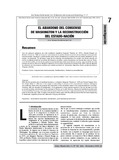Mostrar el registro sencillo del ítem
El abandono del consenso de Washington y la reconstrucción del Estado-nación
| dc.rights.license | http://creativecommons.org/licenses/by-nc-sa/3.0/ve/ | |
| dc.contributor.author | Gutiérrez del Cid, Ana Teresa | |
| dc.date.accessioned | 2011-02-10T18:38:41Z | |
| dc.date.available | 2011-02-10T18:38:41Z | |
| dc.date.issued | 2009-12-31 | |
| dc.identifier.uri | http://www.saber.ula.ve/handle/123456789/32453 | |
| dc.description.abstract | Con los primeros gobiernos de corte neoliberal, Inglaterra Margaret Thatcher en 1979 y Ronald Reagan en Estados Unidos en 1980, se inicia una nueva etapa en la política estatal al servicio de los intereses de las grandes transnacionales. Ideológica y políticamente estos hechos fortalecieron la destrucción del Estado benefactor en los países en desarrollo. Sin embargo, luego de dos décadas de neoliberalismo ha surgido una fuerte reacción en contra, manifestada tanto en los países del bloque ex-soviético, menos favorecidos con los cambios como en Rusia, y en América Latina, en donde los gobiernos posneoliberales están ascendiendo al poder. Una constante de este proceso es que no sólo es un fenómeno regional, sino mundial, que transcurre desde el año 2000. Caso de ejemplo se observan con los procesos políticos que vienen ocurriendo en Venezuela, Argentina, Brasil y posteriormente en Uruguay y Bolivia. | es_VE |
| dc.language.iso | es | es_VE |
| dc.publisher | SABER-ULA | es_VE |
| dc.rights | info:eu-repo/semantics/openAccess | |
| dc.subject | Corporaciones transnacionales | es_VE |
| dc.subject | Neoliberalismo | es_VE |
| dc.subject | Gobiernos posneoliberales | es_VE |
| dc.title | El abandono del consenso de Washington y la reconstrucción del Estado-nación | es_VE |
| dc.title.alternative | Washington’s consensus abandonment and the Nation-state reconstruction | es_VE |
| dc.type | info:eu-repo/semantics/article | |
| dc.description.abstract1 | With the first governments of neoliberal tendency, in England, Margaret Thatcher in 1979 and Ronald Reagan from the United States in 1980 start a new stage in state politics in service of the transnational’s interests. Ideological and politically, these facts empowered the destruction of the beneficent state in the underdevelopment countries. However, after two decades of neoliberalism, it has appeared a strong reaction against it; this can be seen as in the ex-soviet countries, less favored by the changes in Russia, as in Latin America, where post-neoliberal governments have possibilities for power. A constant of this process is that it is not only a regional phenomenon, but worldwide that goes by since the year 2000. A subject of example is being watch with the political process that has been happening in Venezuela, Argentina, Brazil and afterwards Uruguay and Bolivia. | es_VE |
| dc.description.colacion | 7-17 | es_VE |
| dc.description.email | anatere08@prodigy.net.mx | es_VE |
| dc.description.frecuencia | semestral | |
| dc.identifier.depositolegal | 1996-02TA-3 | |
| dc.publisher.pais | Venezuela | es_VE |
| dc.subject.facultad | Núcleo Táchira (NUTULA) | es_VE |
| dc.subject.keywords | Transnational corporation | es_VE |
| dc.subject.keywords | Neoliberalism | es_VE |
| dc.subject.keywords | Post-neoliberal governments | es_VE |
| dc.subject.publicacionelectronica | Aldea Mundo | |
| dc.subject.seccion | Aldea Mundo: Investigación | es_VE |
| dc.subject.thematiccategory | Artes y Humanidades | es_VE |
| dc.subject.tipo | Revistas | es_VE |
| dc.type.media | Texto | es_VE |
Ficheros en el ítem
Este ítem aparece en la(s) siguiente(s) colección(ones)
-
Aldea Mundo - Año 014. Nº 028
Julio- Diciembre 2009


